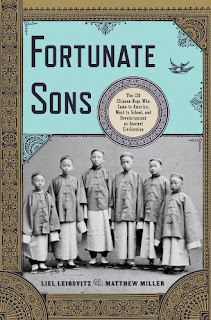Fortunate Sons
So I just finished up Fortunate Sons by Liel Leibovitz and Matthew Miller. This is a true story about the Chinese Educational Mission:
"[120] boys were sent to the United States in 1872, during the twilight years of the Qing Empire, in the hopes that a few years in America's leading schools would produce a band of leaders capable of rescuing China from its technological and military stupor."
This book is a fascinating read, and it provides a rather unique and personal look at China in the midst of turmoil and change. It also touches upon a lot of issues that seem relevant today to China and to Asian Americans.
The story starts off with Yung Wing, the very first Chinese to attend Yale. Yung is fascinated by American culture and the American educational system. Whereas the Chinese educational system taught classic Confucian texts, poetry and calligraphy and churned out intellectual bureaucrats, the American colleges focused on developing leaders and innovators.
Yung heads back to China after graduation and finds that his American education isn't of much use to him at first in finding a job. He also finds that he's out of place, since he's been away for so long. His Chinese is rusty, and his mannerisms are perceived to be arrogantly American.
Then he gets into a physical altercation with a bigoted and condescending Scotsman, and word spreads among the native Chinese and European foreigners about this English speaking Chinese man educated in the States. His reputation as a guy who can traverse 2 different cultures and not take some white colonist's bullshit earns him steady work as a translator. Yung's reputation also piques the interest of a progressive government official. This government official values Yung's opinion, because he's dealt with the foreigners, lived among, seen their world and taken up some habits and ways of thinking.
Yung proposes that China send some of her boys to America for high school and college, to learn new technologies and new ways of thinking. The hope was that the schooling would mold these boys into leaders of industry and military, that they would help modernize China, bring her out of the dark ages and repel the European and Japanese invaders. Hence the Chinese Educational Mission was born.
Initially 30 boys were selected to be schooled in America for a period of 15 years. After only nine years, however, the Qing government disbanded the Chinese Educational Mission and recalled all of its students, which had totaled at 120. Forces within the Chinese government who were resistant to change brought about the mission's demise. When the boys returned, they were:
"carted in wheelbarrows by coolies, under armed guard, to an abandoned school building, filthy, damp and pest-ridden — where they were confined for days and not allowed out to see their families. Along the route, they were jeered at by onlookers and vilified as 'foreign devils... Under such conditions, some succumbed to illness and despair. The maltreatment gave them a taste of the arrogance, callousness and inertia so prevalent among China’s government bureaucrats, against whom some vented their anger with scathing comments in letters to their friends. Nonetheless, for many of them, the experience amounted to a crash-course in maturity: it tested their patience and steeled their resolve to prove that they had the ability and strength of character to fulfill their country’s expectations."
The boys were eventually released, and although they had to deal with millions of people entrenched in thousands of years of cultural dogma, they became the leaders they were intended to be. These men helped usher China into the modern era.
Although the authors go off in odd tangents in the book, they do tell a compelling story about a pivotal time in history where China struggles to reinvent herself.




Comments
I think the biggest mistake China made was turning inward under communist rule. They didn't engage, they didn't evolve with the rest of the world.
It'll be interesting to see how China handles their new status as a super power. Will they reign in corruption? Will they evolve as a society more enlightened than the current vulgarian of wealths we see now?
I suppose they have to go through these growing pains, much as the US did in the Gilded Age, the wealthy oligarchs and robber barons.